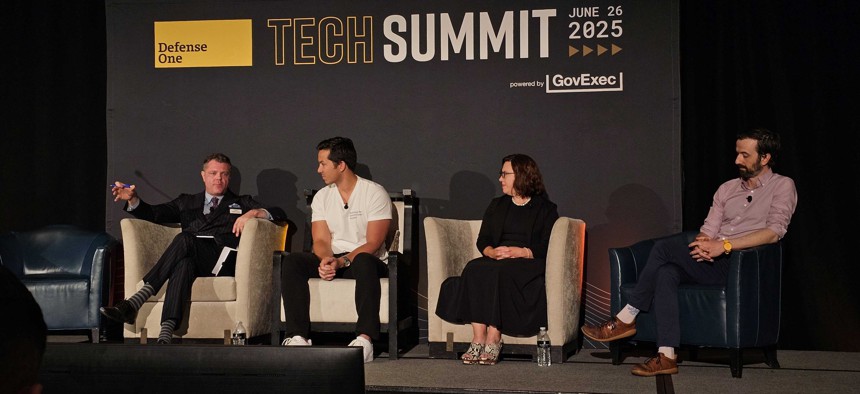AI companies see openings to improve federal, defense operations

Defense One's Patrick Tucker, left, leads a discussion with Shield AI's Brandon Tseng, OpenAI's Katrina Mulligan, and David Payne, of DIU Strategic Initiatives, at the Defense One Tech Summit in Arlington, Virginia, on June 26, 2025. Defense One
Executives at OpenAI and Anthropic have both championed artificial intelligence as the future of government workflows.
Large artificial intelligence providers are angling for their foundation models to form the bedrock of government AI use cases, with leaders from both OpenAI and Anthropic pitching the technologies as an expeditious solution for the public sector, namely defense operations.
Following the June 16 announcement of a new OpenAI for Government offering, Katrina Mulligan — the national security head at OpenAI for Government — said the new initiative will focus on tailoring AI tools to innovate in specific public sector operations
“OpenAI is laser-focused on … being the leading foundation model developer,” Mulligan said on Thursday at the Defense One Tech Summit. “I really think that there's going to have to be a lot of creativity in how we do this. It's not going to be one way. It's not going to be one uniform application. It's going to be very dependent on the use case, and very dependent on the trade offs that you're willing to make and not willing to make.”
Mulligan added that the gap OpenAI for Government is looking to bridge is between available technology and what is occurring inside government operations, particularly in the defense sector. Beginning its public sector operations with a $200 million pilot program with the U.S. Department of Defense’s Chief Digital and Artificial Intelligence Office, she said the best way to understand how to improve operations with AI is through practice and usage.
“We are going to have really great insights about how this technology can transform defense missions,” Mulligan said. “But the most brilliant ideas that I think are going to work are gonna emerge from the men and women who serve. And the only way that those ideas are gonna surface is by getting the technology into the hands of those men and women.”
Mulligan added that OpenAI’s foray into public sector AI implementation is part of the larger modernization agenda that federal agencies have undertaken, particularly in regards to the reduction of mundane and bureaucratic tasks.
“If you think about what it is like for the men and women who serve and where the toil is in their you know daily workflow, or the toil of a cybersecurity analyst, for example, you can take these jobs that are pretty grueling –– especially at the earlier stages –– and take out the pieces that people really don't enjoy and free them up to do things that only humans can do,” she said.
Mulligan’s comments come as other private sector players are also angling to make their AI products available for federal customers. On Wednesday, Anthropic Co-Founder Jack Clark testified before the House China Select Committee that one pillar in America leading AI innovation worldwide is the adoption of AI in national security operations.
“By securely integrating AI capabilities directly into national security workflows, the U.S. government can achieve a dual strategic advantage: developing expertise in leveraging these technologies for maximum public benefit while simultaneously understanding how adversaries might exploit similar systems for asymmetric warfare,” he said. “This approach enables agencies to continuously refine their AI workflows, building institutional knowledge that strengthens both defensive capabilities and offensive preparedness.”
Clark also echoed Mulligan’s point that AI in defense systems will both expedite daily workflows and teach the federal workforce about the technology itself.
“It's critical that we use this technology to invest in our intelligence and defense ecosystems — this will both help them move faster to deal with a rapidly moving threat landscape, and it will also help them gain a better understanding of AI itself,” he said.


